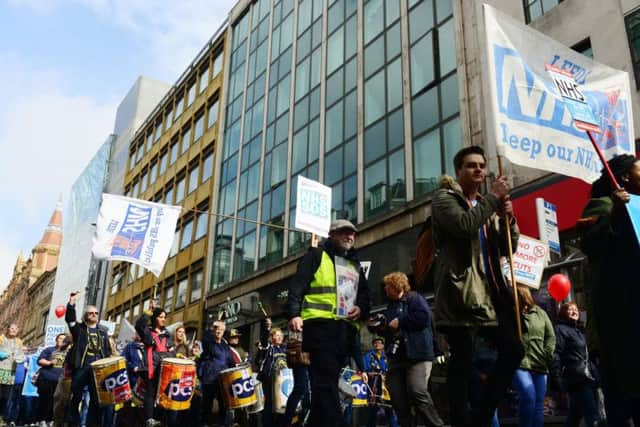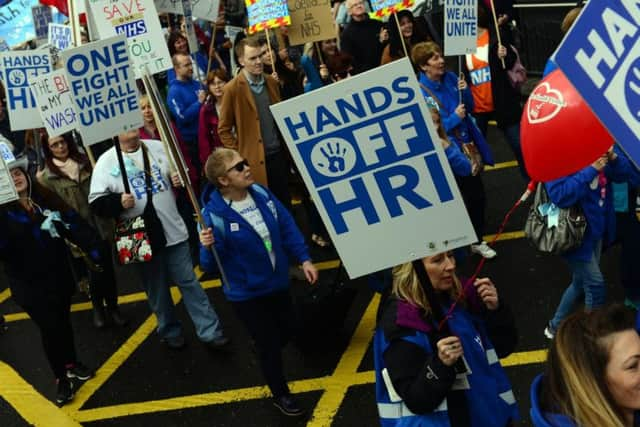Leeds NHS demonstration: Campaigners explain why they are marching


Yorkshire union members, patients and NHS staff gathered in the city centre outside Leeds Art Gallery on The Headrow, for what organisers claimed was among the largest health protests in the city for almost two decades.
Protestors young and old travelled from across the UK for the demonstration, which was highlighting proposed changes and funding cuts to services across Yorkshire.
Advertisement
Hide AdAdvertisement
Hide AdJohn McMahon was among a circle of campaigners from Weetwood who marched through Leeds.


The 62-year-old told the YEP: "I think the NHS is going to be privatised. I'm concerned about the cuts to services that is why we are here today.
"We are going to end up with an American health system in the UK."
The march was organised by Yorkshire Health Campaigns Together, a collection of unions and groups campaigning against NHS cuts.
Advertisement
Hide AdAdvertisement
Hide AdCampaign groups represented included Save Huddersfield Royal Infirmary (HRI), Dewsbury and Barnsley activists concerned about hospital downgrades and Sheffield paramedics highlighting the increased use of private ambulances in the region.


Junior doctors and student nurses also joined the march, and called on the Government to reinstate bursaries to boost applications for nursing and midwifery courses.
Dad-of-two Mike Smith, an NHS campaigner from Barnsley who attended the demonstration, said: "I'm impressed with the turnout.
"It's not just Barnsley, people are here from Huddersfield, Lincolnshire and other places that are facing cuts to their services."
Advertisement
Hide AdAdvertisement
Hide AdMembers of Unison and Unite unions joined together with GMB activists, who donned hospital scrubs and pushed a mock bed along the streets.


Tracy Brabin, MP for Batley and Spen also took part in the event and later spoke at a rally in support of the NHS and protecting services for future generations.
Mary Cousins, 63, from Chapel Allerton, said she was marching over fears waiting times for operations could increase.
She said: "I had my hips replaced about three years ago and it was perfect.
Advertisement
Hide AdAdvertisement
Hide Ad"It was three months from the decision until the operation but now I can't believe some people will have to wait up to a year.


"It's short-termism to cut preventative services like mental health. Those are the things being cut and I find it distressing."
After setting off from The Headrow shortly after noon, protestors marched onto Vicar Lane, Boar Lane and Briggate, as the demonstration brought traffic in the city centre to a standstill, before returning to the art gallery.
They were accompanied by brass and samba bands and following the march, a short rally was held with speeches from former doctors and campaigners in Leeds' Victoria Gardens.
Advertisement
Hide AdAdvertisement
Hide AdOne of the key focus of campaigners' frustrations during the demonstration was the NHS’ Sustainability and Transformation Plans (STPs), which propose sweeping changes to services across the country to cut costs.
A spokesperson for Yorkshire Health Campaigns Together said: "The truth is we do not need to cut our health services. The NHS was set up in 1948 at a time when the national deficit
was greater than it is now on the grounds that it was not only morally right but cost effective to provide good health care for everyone, and the argument holds true today.
"We are the sixth richest nation in the world yet choose to spend less on health than most other European nations and have far fewer hospital beds and doctors."